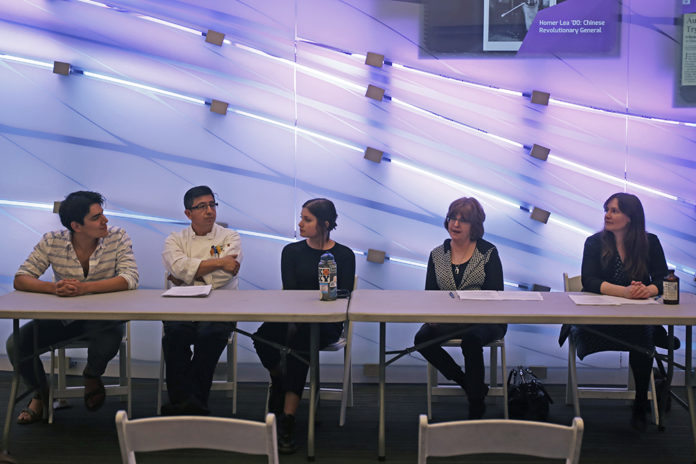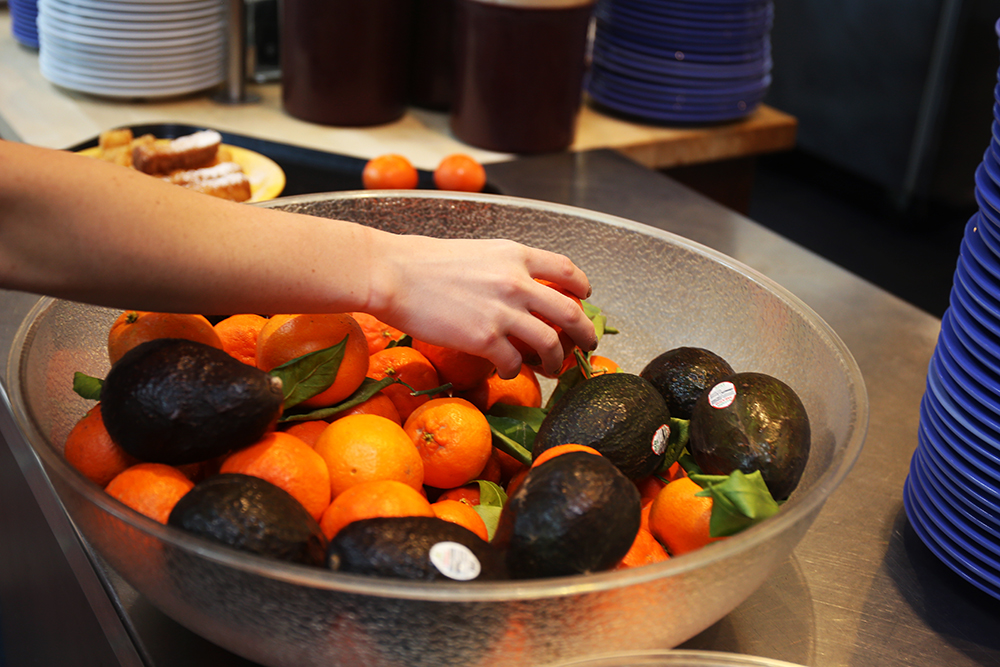
Representatives from various departments across Occidental gathered for a panel in Johnson Global Forum Feb. 28 to provide a more transparent view of how food systems operate on Occidental’s campus. The panel members included Amy Andrews Muñoz, associate vice president of Hospitality Services, Conrado Gomez, chef de cuisine for Campus Dining, Teagan Langseth-Depaolis (sophomore), program coordinator and co-founder of the Excess Food Recovery Team (EFRT), Diego Zapata (senior), director of the Food, Energy, and Sustainability Team (FEAST), and Sharon Cech, director of Regional Food Systems at the Urban & Environment Policy Institute (UEPI).
“The purpose is to bring together all of the people that work in Oxy’s food systems because we all work together a lot,” Kaye Jenkins (sophomore), the Campus Dining lead intern for the upcoming school year 2019–2020, said. “[As well as] to put a face to the entity of Campus Dining and of UEPI and break down the idea of the administrative branch being impermeable.”

A primary inspiration for the event was the recent production of the Food at Oxy guide, spearheaded by Cech. The 42-page document provides a wide array of information about food on Occidental’s campus, including addressing the food sources, food-related organizations and food options in the local area. The idea for the document came about in response to the different food-related projects or initiations that exist beyond Campus Dining, such as community programming and academic work in UEPI.
The panel and the document both served as platforms for members of the food community at Occidental to communicate the newly-created procurement standards for Campus Dining, according to Sammy Herdman (senior), the current lead intern for sustainability research and implementation. The standards are referenced when deciding what food to purchase for the campus. Standards for sustainability specified that food within 250 miles of campus qualifies as local. Recently, community procurement standards were created to specify how Campus Dining should purchase food in the local area.
According to Herdman, controversy around the decision to stock Berry Bowl products in the Marketplace prompted the creation of this procurement section. Despite student protest, Campus Dining decided to keep Berry Bowl items given that more students were purchasing the product than those that were protesting against it. Through this decision, however, they decided to create the local food procurement standards to make sure a similar disagreement would not happen again.
Zapata, a Northeast Los Angeles native, spoke on the panel about the process he and Herdman carried out to ensure the businesses they were supporting in Northeast Los Angeles were in line with the Los Angeles Good Food Purchasing Policy. The duo surveyed a handful of Highland Park restaurants along Figueroa Street and York Boulevard to collect data on their products’ price points, how many employees Iive locally and how many employees speak Spanish.
According to Zapata, it is crucial that Occidental foster a good relationship with Highland Park and Eagle Rock, as Occidental is a part of the wider community.
“A good way of doing that is to make sure we support long-standing businesses that have been here for decades and are accessible for the residents that have been here for a while,” Zapata said.
The positive relationship between student-led sustainability efforts and Campus Dining is further demonstrated by the creation of the Excess Food Recovery Team (EFRT) last year by Langseth-Depaolis and Olivia Valicenti ’18. Prior to the formalized organization, Mel Devoney ’18 voluntarily transported excess frozen food from Campus Dining every two to three months.

In October 2017, Occidental created a paid position within the Office of Community Engagement, and Langseth-Depaolis and Valicenti became co-coordinators of the program. Before transporting the food to local organizations, the food is weighed and entered into a system that counts the donated food for the Food Recovery Network, a nationwide student-led movement aiming to fight food waste and feed more people. In the 2017–18 school year, a total of 3,580 pounds of food were donated to organizations such as Recycled Resources and the Union Station Homeless Mission.
Cech also spoke about the creation of a food studies minor based in UEPI. As far back as 2011, a group of faculty came together to look at what food studies classes already exist at the college across multiple departments. The proposal just recently passed through department chairs and will be voted on by faculty in the next month, according to Cech.
The panel ended with a Q&A session in which one student inquired about how all students can get involved.

Andrews-Muñoz spoke about the wide range of ways students can have agency in Campus Dining: submitting to the online suggestion form, joining one of the food organizations on campus such as FEAST or EFRT in a paid or volunteer position, and buying sustainable food.
“One thing Oxy students do every day is they vote with their dining dollars,” Andrews-Muñoz said. “When you purchase something that’s sustainable, it stays on the menu and goes toward our Real Food Challenge percentage.”
The Real Food Challenge is a national program where college and universities have signed a pledge to purchase and serve 20 percent sustainably sourced food by 2020. Occidental, however, pledged to purchase and serve 30 percent sustainably sourced food by 2020.
According to Zapata, FEAST strives to make Occidental’s food culture equitable, sustainable and satisfying through providing accessible programming to students.
“Our ultimate goal is to teach as many students as possible where their food comes from and how to grow it,” Zapata said. “That way they can lead sustainable lives after they leave Oxy. [College] only lasts four years, then what are you going to do after?”
This article was revised March 8, 2019 to correct an inaccuracy in Amy Andrews Muñoz’ title. Muñoz is the associate vice president of Hospitality Services, not assistant vice president. Additionally, the Real Food Challenge was referenced as a 30 percent national pledge. It is a 20 percent national pledge.
![]()






























